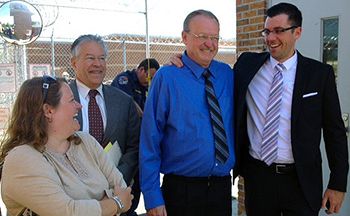Michael Parker spent 22 years in jail for crimes he did not commit—and now, thanks to work by Duke's Wrongful Convictions Clinic, he is finally free.
Parker asked his lawyer, Sean Devereux, Trinity '69, about the possibility of working with the clinic—which is one of seven run through the Duke School of Law—after hearing stories of its success in a case similar to his. Now, 22 years after he was placed in jail on false charges of sexual abuse, Parker is able to appreciate the small aspects of life that he once enjoyed, including long bubble baths and watching fireflies.
"We knew this might be Mr. Parker's last chance," said Theresa Newman, co-director of the Wrongful Convictions Clinic and Law '88. "That was our goal from the very beginning. Our focus here at Duke was getting a high-quality motion for appropriate relief filed and doing it fairly quickly."

Parker was imprisoned at Craggy Correctional Center in Asheville on charges of sexual abuse against his three children.
The Wrongful Convictions Clinic provided expertise on the legal claims involved in the case, relying heavily on the contributions of current law students.
The clinic's team built the case for Parker's evidence on several planks including unreliable testimony and misconduct by the prosecution in the original trial.
"Our task was to finalize the motion that was filed with the court," said Pate Skene, Law '14 and one of the clinic team members on Parker's case. "The fact that the normal course of appeals had been exhausted for this case, however, presented many challenges."
Sitara Witanachchi, Law '14 and a clinic team member, noted that Parker's original trial had included major prosecutorial misconduct—a fact that ended up working to the clinic's advantage in their efforts to overturn the conviction.
"The trial was not conducted in a manner compliant with due process and that was one argument we really wanted to develop," Witanachchi said.
Perhaps the biggest argument used by the clinic revolved around the hysteria that existed around child sexual abuse cases in the 1980s and 90s, when Parker was originally tried. Since then, medical experts and forensic psychologists have studied the phenomenon of children's susceptibility to interrogation procedures.
"People found out that these kinds of memories could be implanted or inculcated in children, intentionally or unintentionally," said Skene, who is also an associate professor of neurobiology. "Once you understood that it could happen, your interpretation of the interview process was very different."
This was particularly important to the final verdict, as the prosecutor's original case rested upon the accusations of the Parker children.
"If they had heard the evidence that would now have been available to them, they never would have decided to convict," said supervising attorney Jamie Lau, Law '09.
The announcement of the verdict was an emotional one, Skene noted.
"I was sitting behind him, and when the judge uttered the words—and I don't think this was my imagination—something shifted in his manner," Skene said. "This hit him. His body changed posture as if to give out a sigh of relief."
Parker's case is the fifth since 2010 to be overturned through work by the clinic. Two convictions were overturned both in 2010 and in 2012, and a sixth client's release is pending for later in 2014.
There is even more progress ahead, Newman said, with seven additional cases that have been filed and are currently waiting on judiciary action.
Until recently, the clinic conducted most of its work with a $1.25 million grant issued by the provost's office in 2007, but those funds have now run dry. The U.S. Department of Justice awarded a $249,718 grant to the clinic last September, Newman said, but continuing to secure additional funding is an ongoing process.
Following his ordeal, Parker has been enjoying his new life of freedom, Newman noted.
"I can tell you that he has been enjoying Bojangles' breakfast every morning," she said with a laugh. "He has also said he will never grow tired of going out at night and looking up at the stars. He hadn't seen the night sky the entire time he was incarcerated."
Get The Chronicle straight to your inbox
Signup for our weekly newsletter. Cancel at any time.
